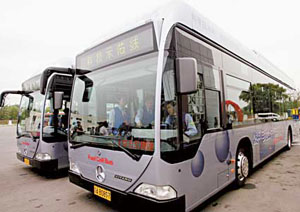| Tools: Save | Print | " target="_blank" class="style1">E-mail | Most Read |
| First Clean Fuel Buses Appears in Beijing |
| Adjust font size: |
|
Emission-free fuel cell buses, which could help Beijing solve its power shortage and pollution problems, began their rounds in the city yesterday.
The three buses will run from 9?AM to 3?PM during weekdays, following an 18.2 kilometre route through the northwest suburbs, from the North Gate of the Summer Palace to Wudaokou. The DaimlerChrysler buses were purchased with United Nations grants to help China research and develop environmentally friendly vehicles. Altogether only 36 DaimlerChrysler fuel cell buses are running worldwide. "Today marks the first public operation of fuel cell buses in Beijing. It is also the first ever in China," said Renaud Meyer, United Nations Development Programme (UNDP) deputy resident representative in China, at the buses' launch. The buses are powered by hydrogen fuel cells, which produce no exhaust emissions. A hydrogen refuelling station, to be fully operational this summer, will also be the first of its kind in China, added Meyer. The buses are running under a demonstration project to show fuel cell buses can be used commercially throughout the country, jointly launched by UNDP China, the Ministry of Science and Technology and other partners. Meyer said they would not only reduce damage to the environment, but also offer a new solution to shrinking fossil fuel supplies. "Through this project we can build a foundation for full-scale commercialization of hydrogen fuel cell buses to promote sustainable transport, use of renewable energy and cleaner air," he said. Three fuel cell buses will also be introduced in Shanghai late this year, said Wang Ju, director of the demonstration project office. Wang said that, with international aid, Chinese scientists and researchers would collect data on the buses' success to support efforts to commercialize fuel cell technology. Coal and oil, the two primary sources of air pollution, constitute 90 per cent of China's total energy use. The transport sector, which relies almost entirely on fossil fuels, is expected to account for most of China's oil demand over the next 20 years. It is predicted that by 2010, the percentage of emissions from big cities will represent 64 per cent of total emissions from all cities in China. "That's why we must seek alternative fuel vehicles," said Meyer. (China Daily June 21, 2006) |
| Tools: Save | Print | " target="_blank" class="style1">E-mail | Most Read |
 |
| Related Stories |

